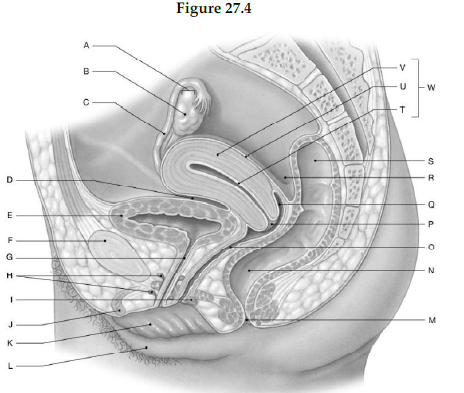Using the figure below, identify the labeled part.

1) Label A: ______________________________
2) Label B: ______________________________
3) Label C: ______________________________
4) Label D: ______________________________
5) Label E: ______________________________
6) Label F: ______________________________
7) Label G: ______________________________
8) Label H: ______________________________
9) Label I: ______________________________
10) Label J: ______________________________
11) Label K: ______________________________
12) Label L: ______________________________
13) Label M: ______________________________
14) Label N: ______________________________
15) Label O: ______________________________
16) Label P: ______________________________
17) Label Q: ______________________________
18) Label R: ______________________________
19) Label S: ______________________________
20) Label T: ______________________________
21) Label U: ______________________________
22) Label V: ______________________________
23) Label W: ______________________________
1) Ovarian follicle
2) Ovary
3) Uterine tube
4) Vesicouterine pouch
5) Urinary bladder
6) Pubic symphysis
7) Urethra
8) Paraurethral glands
9) Greater vestibular gland
10) Clitoris
11) Labium minus
12) Labium majus
13) Anus
14) Rectum
15) Vagina
16) Cervix
17) Fornix
18) Rectouterine pouch
19) Sigmoid colon
20) Endometrium
21) Perimetrium
22) Myometrium
23) Uterus
You might also like to view...
Which of the following structures contains otoliths (ear stones)?
a) macula of the saccule b) cupula of the crista c) tectorial membrane of the organ of Corti d) basilar membrane of the cochlear duct e) tympanic membrane
If a reduction of body mass is one's goal, then the factor in the animal energy equation one would most like to ________ is ________
a. decrease; EBMR b. decrease; Eloss c. decrease; Eproduction d. increase; Eproduction e. increase; Einput
Which of the following is an example of simple columnar epithelial tissue?
a) epidermis/skin b) tubules/kidney c) lining/gastrointestinal tract d) lining/blood vessels
Erythromycin is an antibiotic that prevents the tRNA molecule from moving from the A site to the P site on the rRNA complex during translation in bacterial ribosomes. Predict the effects of this drug on protein synthesis
What will be an ideal response?